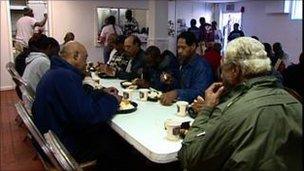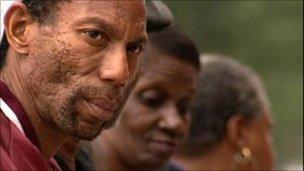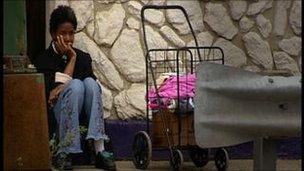Blight of black unemployment in Obama's hometown
- Published
- comments
Michael Rivers used to earn $27 an hour as a factory foreman, but now he lives on food stamps
The lights go out and the people sitting around the trestle tables burst into a heartfelt round of Happy Birthday.
Betty Price, a big woman, resplendent in a purple dress and beads, is "Mother Price" to them. Like a good mother she makes sure her children are fed.
For 23 years she has been feeding the hungry, external in Englewood, Chicago, through her organisation Feed, Clothe and Help the Needy, external.
"I started off with a hotplate, an electric skillet and a crock pot, I didn't have no kitchen," she says.
Now there is a kitchen in the small building, and helpers too.
The gratitude for the big plastic plates of steaming food is the same. Eager and silently ravenous people fall upon the piles of free food - fried chicken, potato salad, pasta and buns - as they always have.
'Hoping and praying'
What has changed is the sort of people coming here in need. Mother Price is hard pressed to cope.
"Oh my God, the economy is so bad," she says, "I've been hoping and praying every day that I can stay open, 'cause it's hard.

Qualified people have started coming to the food bank to feed their children as they cannot find work
"I don't get the donations in, try to keep the light and gas and phone going and all those kinds of things, keep feeding the people.
"We feed over 5,000 people a month. Everybody is in need, scratching and pulling, and trying to make ends meet."
This is a brutally poor area, external. It has long been so, but it has gotten worse.
One of those getting a free meal, along with her 11-year-old son, is Felicia Smith. She's a qualified nursing assistant. But she hasn't been able to find work since last November.
"I know we in a recession right now; it's more people standing in food lines than there was last year; and every year its growing bigger and bigger, because of the lack of jobs."
Technically, she's wrong. America is not in recession. But in many parts of America this doesn't feel anything like recovery.
New face of poverty
Especially when you have qualifications, but have to rely on charity to feed your family.
"It's very important when you don't have any money to feed your children, you can come here to Mother Price, she makes sure you can eat," Ms Smith says.
"If you can get at least one or two meals out of the week, you know, your stomach will be full, not for the whole day, but you have something on your stomach so you can survive another day."
This is the new face of poverty: those who were the lucky ones, the hard-working ones, the provident ones in a poor community, now find themselves struggling.
Outside the centre, there are the telltale signs of deep-rooted urban poverty.
Men push wire supermarket baskets around containing scrap metal to sell. The homeless hang around the street corners.
But there is a new desolation. In a street of substantial, elegant houses every other building has blank eyes, smashed windows replaced by thin wood.
Each one could tell a story of lost jobs, lost families.
On the next street to the centre is a boarded up BBQ restaurant. On the smashed up window is a fading message from 2008: "Congradulations [sic], Barak Obama'.
Life-changing moment
Here in the president's own hometown, black unemployment stands at 21%.

The US African-American unemployment rate is 16.7%
The poor may always be with us, but in the United States there are more of them than ever before, and more of them are black.
The African-American unemployment rate is 16.7%, the worst it has been for 27 years, double the white rate of 8%.
Michael Rivers is one of the helpers at the centre, donning plastic gloves, to deliver a hot meal to those less fortunate than himself. But he too is one of the new poor.
He'd had a steady job ever since he was 18. He worked for an ice company after he left school.
Then for 23 years he worked for one firm, which cured and smoked meat. He was in charge of mixing the chemicals and was a foreman overseeing around 20 men.
One Monday morning in 2007, Mr Rivers turned up for work and found there wasn't any.
"On Friday, the guys said 'we'll see you next week.' So we got to work Monday and they had this whole area locked down," he recalls.
"We used to park our cars in the back and they had that locked down. No trucks in the dock.
"They had security hand us our cheques. No-one explained what happened to the company. They were just gone."
That moment changed his life. He has tried hard to find a job, and every week goes for training at the job centre.
But there are few jobs around for an unskilled 50-year-old. So he's lost everything.
'Optimistic'
"The difference in my life is from making $20 an hour to not making anything, is the big difference. I had a car and everything," Mr Rivers said.
"Work is the foundation. It's important to be able to take care of your family first and foremost. Having a place for them to stay.
"Eating dinner with them. Food on the table. Clothes on their back. All of that is taken away from you without a moment's notice."

Homelessness has risen in deprived areas as a result of the hard economic times
His unemployment benefit has run out and he relies on food stamps worth $200 (£130) a month. He's had to leave his family flat and move in with his mother.
"I would have had my own place if I was still working," he says. "You have a hard time with relationships. That's the biggest thing.
"If you don't put nothing in, you can't get nothing out. I was living with someone, and I have a 14-year-old daughter.
"But I'm not able to do the things now I was doing then, so your relationship suffers."
Mr Rivers says it was worse for others.
"There was one guy I used to work with, John. He was there about 10 years before I started there.
"After he lost his job, his unemployment ran out and he lost his wife and kids. He killed himself last year."
Mr Rivers is a fighter - he'd never do that, he says.
He's off to interviews for two jobs: one telemarketing, the other shovelling snow in Chicago's harsh winter. He's trying hard to remain optimistic.
But the enduring fact is that in Obama's America it is harder for a black man to find work than a white.
Why?
I'll try to answer that tomorrow.